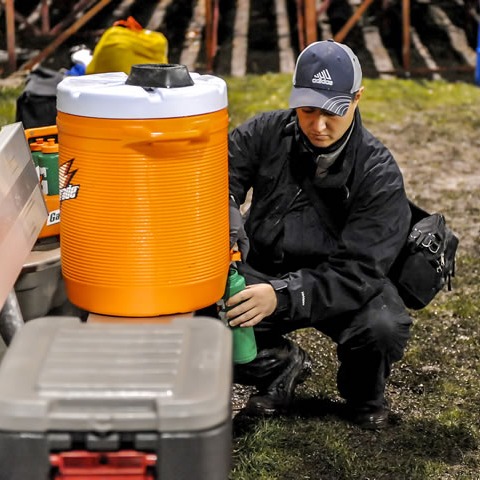Can you imagine having doctors, surgeons, dentists, ophthalmologists, and otolaryngologists on speed dial? Kai Seshiki, Certified Athletic Trainer at Colton High School, part of Pullman Regional Hospital's Regional High School Athletic Training Program does- and he calls them when he's treating a student-athlete for injury or illness.
What does an Athletic Trainer do?
Kai Seshiki, Certified Athletic Trainer at Colton High School, part of Pullman Regional Hospital's Regional High School Athletic Training Program, serves a key role in the health and safety of high school student-athletes. Seshiki attends practices and events, tends to athletes pre- and post-competition and attends to any issues that pop up- including first aid and emergency care.
The Regional High School Athletic Training Program places certified athletic trainers in Colton High School, Garfield-Palouse High School, Potlatch High School, and Pullman High School.
“The goal is that I get to sit there, watch a game, and do absolutely nothing. But there’s a variety of things that happen in sports. We've all watched TV and seen the horrific and the amazing things that can happen. My job is to be there and facilitate the best possible outcome for our athletes," says Seshiki.
A True Team Approach
The athletic training program was put into motion by Pullman Regional Hospital and Inland Orthopaedics. It’s a unique approach to place a professionally trained athletic trainer in a high school, with unparalleled access to specialists and surgeons.
The program enlists a wide network of physicians, specialists, and athletic trainers with different experiences. “It's fair for me to take something I'm not well-versed in and put it into somebody else's hands, because the overall outcome needs to be the health of the individual,” shares Seshiki. Seshiki can get a second opinion from a surgeon or specialist and send his injured athletes to these providers without having to get a referral or endure a long wait.
"I can call these professionals right then and there when something happens. Having access to these medical professionals and other athletic trainers through this program is what really seals the deal as amazing," he says.
“If we look back into our history of providing medical care for athletes, none of us growing up ever got the opportunity to see a real professional that was there the entire time. We maybe got to see a school nurse, or, if we were hurt bad enough, we could make it into the doctor at some point,” notes Seshiki. “Having an athletic trainer on site provides me exposure to my athletes every single day.”
Focus on the Game
That consistency allows Seshiki to keep tabs on the athletes, better track their progress, and create more effective treatment plans. It also helps take responsibility off the coach—as well as reassure parents that their kids are being professionally taken care of.
“A coach is an amazing individual. They know the sport inside and out. But for them to have to be responsible for the medical care of their athletes on top of coaching the sport, that's a lot to ask of someone. Having a trainer there takes that weight off the coach,” explains Seshiki.
Beyond the Playing Field
As for the kids, Seshiki says one of the great things about working in a smaller school is that he gets to start developing relationships with them from a very young age. “By the time they're seniors, where they're asking for letters of recommendation or they're being those future humans we want to see, I know I got to play a small role in that,” he adds.
However, working in a small school also presents challenges. Sometimes eighth graders are playing on the varsity team with juniors or seniors. That can introduce a pretty significant difference in age, body composition, strength, and mental maturity—which means Seshiki has his work cut out for him. Still, he really enjoys the work.
“I get to work within a very supportive community that is making sure their kids are taken care of, giving me an exposure to these really neat humans who continue to love sports and do the right things by playing sports. I get to share in their lifetime experiences. That's the best thing about it.”
Click here to listen to an in-depth conversation on this topic with Kai Seshiki, Certified Athletic Trainer at Colton High School, part of Pullman Regional Hospital's Regional High School Athletic Training Program.
